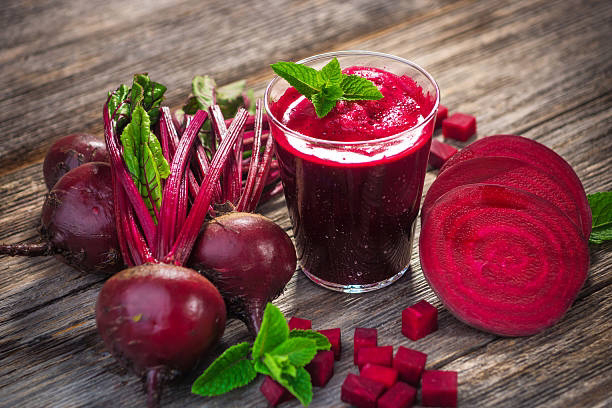1. Lowers Blood Pressure: Beetroot contains nitrates, which your body converts into nitric oxide. Nitric oxide helps your blood vessels relax and widen, which can lead to lower blood pressure. This effect is especially beneficial for people with hypertension.
2. Boosts Exercise: Nitric oxide also improves blood flow to your muscles, which can enhance exercise performance and reduce fatigue. Athletes often drink beetroot juice to improve their endurance and stamina during workouts or competitions.
3. Good for the Brain: Improved blood flow from beetroot consumption can benefit cognitive function and overall brain health. Some research suggests that beetroot may help slow down age-related cognitive decline and reduce the risk of neurodegenerative diseases like Alzheimer's.
4. Fights Inflammation: Beetroot contains betalains, which are potent antioxidants with anti-inflammatory properties. These compounds help fight inflammation in the body, which is linked to various chronic diseases such as heart disease, diabetes, and arthritis.
5. Packed with Nutrients: Beetroot is rich in essential vitamins and minerals, including vitamin C, potassium, folate, and manganese. These nutrients play vital roles in maintaining overall health, supporting immune function, and preventing deficiencies.
6. Helps Digestion: Beetroot is an excellent source of dietary fiber, which aids digestion and promotes gut health. Fiber adds bulk to your stool, prevents constipation, and supports the growth of beneficial bacteria in your gut.
7. Reduces Inflammation: The betalains in beetroot have been shown to reduce inflammation markers in the body, which can help alleviate symptoms of inflammatory conditions like arthritis and improve overall health.
8. Detoxifies the Liver: Beetroot contains compounds that support liver function and help in the detoxification process. By aiding the liver in flushing out toxins, beetroot promotes overall detoxification and supports a healthy liver.
9. Good for Eyes: Beetroot contains beta-carotene, which your body converts into vitamin A. Vitamin A is essential for maintaining healthy vision and may help prevent age-related eye diseases like macular degeneration and cataracts.
10. Increases Stamina: Drinking beetroot juice before exercise has been shown to improve stamina and endurance. This is attributed to beetroot's ability to enhance oxygen delivery to muscles, delay fatigue, and improve energy efficiency during physical activity.
11. Saves Water: Beetroot is a relatively drought-tolerant crop compared to other vegetables, meaning it requires less water for cultivation. This water-efficient characteristic helps conserve water resources, especially in regions prone to drought.
12. Protects Water Quality: Beetroot's deep taproot system helps prevent excess nitrates from leaching into groundwater. Excessive nitrates in water can lead to contamination and pose health risks to humans and animals. By trapping nitrates in the soil, beetroot helps maintain water quality and safety.
13. Good for Soil: Including beetroot in crop rotation plans helps improve soil fertility and structure. Beetroot's deep roots break up compacted soil, allowing better water infiltration and nutrient absorption. Additionally, rotating beetroot with other crops helps reduce soil erosion and minimize the buildup of pests and diseases.
14. Environmentally Friendly: Beetroot requires minimal processing after harvest, reducing its environmental footprint compared to heavily processed foods. This minimal processing reduces energy consumption, greenhouse gas emissions, and waste generation, making beetroot a more sustainable food choice.
15. Versatile: Beetroot can be consumed in various ways, including raw, cooked, roasted, pickled, or juiced. This versatility reduces food waste by allowing consumers to use different parts of the vegetable in various culinary applications.
16. Adds Color to Food: Beetroot's vibrant hue adds visual appeal to dishes, making them more attractive and appetizing. Additionally, beetroot's earthy flavor complements a wide range of ingredients, enhancing the taste and complexity of recipes.
17. Natural Food Coloring: Beetroot's natural pigments can be used as a safe and healthy alternative to synthetic food dyes. From vibrant reds to deep purples, beetroot dye can be incorporated into various foods and beverages to achieve colorful presentations without artificial additives.
18. Edible Leaves: Beetroot leaves, also known as beet greens, are nutritious and edible. They can be cooked like spinach or Swiss chard and added to salads, soups, or stir-fries, reducing food waste and maximizing nutritional intake.
19. Easy to Grow: Beetroot is a relatively low-maintenance vegetable that thrives in a variety of climates and soil conditions. Its ease of cultivation makes it accessible to home gardeners of all skill levels, providing a sustainable source of fresh produce.
20. Affordable: Beetroot is often an affordable vegetable option available year-round in many grocery stores and farmers' markets. Its affordability makes it accessible to a wide range of consumers, ensuring that its health and environmental benefits can be enjoyed by all socioeconomic groups.








